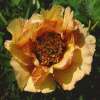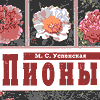origination:
HEPHESTOS (God of Fire) (D-240) Nasos Daphnis, Oct. 17, 1977. First HEPHESTOS 1968. Parentage. Generation - BC-1; Thunderbold x F2 (A). Deep brick red. The purest of all reds, Double. Petals ruffled and pointed. One feels the warmth and fire within each flower. Good stem strength, has pollen, seeds and fragrant. Reliable.
- parents:


Osti (1997)
HEPHESTOS (NASSOS DAPHNIS, 1977). Fiore doppio, grande, interamente rosso scuro. Fogliame verde chiaro, fioritura mediana.
HEPHESTOS Raised by Nassos Daphnis in 1977. Flowers: uniformly dark red; double, large, mid - season flowering, Leaves: pale green.



Deep brick red with pointed, ruffled petals. Fragrant and reliable grower with strong stems
HEPHESTOS A superb dark red open double, highlighted by a glowing golden centre. Several rows of petals give a slightly frilly appearance. The blooms are held beautifully over the well shaped bush.

HEPHESTOS (GOD OF FIRE)
Flower type: Tree Peony—Double
Plant zone(s): 4-8
Bloom time: Mid
Hybridizer: Nassos Daphnis
Deep brick red with pointed, ruffled petals. Fragrant and reliable grower with strong stems.

Hephestos. (God of Fire) Daphnis. 1977. Advanced generation lutea hybrid. American Peony Society Gold Medal winner-2009. APS 'Best In Show'-2012, 2017. Large double to semi-double, brick red with ruffled petals and nice fragrance. The unfurling buds are magnificent (look like rose buds) and the flowers are without peers. Red stigmas, purple sheath and maroon stamens. Simply one of the best hybrids. Plants become large over time and spread wider than high. Bloom is heavy with most stems producing flowers. Makes a well rounded shrub suitable for landscaping. Plants are very rounded and produce many shoots, creating a good landscape specimen. To 4' in Wisconsin. One of my favorites. Sadly, no fertility. Blooms in the later part of the woody peony season. (Thunderbolt x F2-A) These will be nice three year old plants, but Hephestos lags in size from other cultivars after grafting-thus a little smaller than usual.
M.S. Uspenskaja 2003, p. 183:









